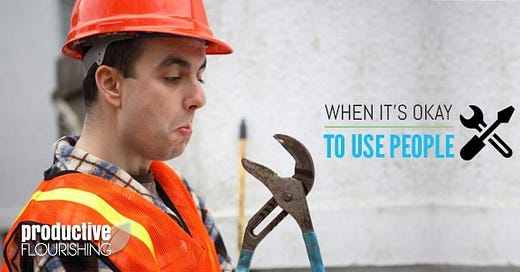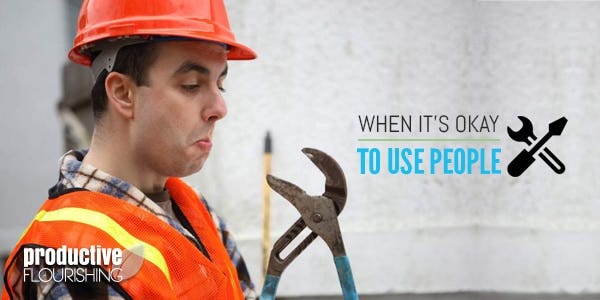When It's Okay To Use People
Are you giving the other person's desires, intentions, and wishes the same weight that you give your own?
Act that you use humanity, whether in your person or in another, always at the same time as an end, never merely as a means.- Immanuel Kant
You're using me right now. You've been using people all of your life. And, in most cases, that's okay.
The quote above is a translation of Immanuel Kant's second categorical imperative, which is sometimes called the Mere Means Principle or the Principle of Humanity.
The Mere Means Principle attempts to give us some parameters on when it's okay to use people and when it's not. We all intuitively get that there are some occasions in which we're using people and there's no problem or tension to it, as in the way that we might use our spouses or friends to cook a meal. There are other cases, though, in which it's not okay to use people.
Honor and Respect Other People's Humanity
The difference between the cases in which it's okay to treat someone as a means to an end, and those in which it's not, largely boils down to whether we're giving the other person's desires, intentions, and wishes the same weight that we give ours.
It's called the Principle of Humanity because its advocates believe that there are certain ways you can't treat people if you truly honor their humanity. Their humanity places limits on what you can do to them, even if treating them in certain ways would produce a greater good for other people. It rules out slavery, rape, coercion, theft, duplicity, adultery, medical experimentation, and murder, just to name a few things.
Contrast this use with the way we use manufactured tools. Even though we know that a screwdriver isn't supposed to be used as a hammer, in a pinch, we'd use the handle end of the screwdriver to bang on something. We're not worried about the screwdriver's ends because the screwdriver doesn't have any at all. However, we wouldn't grab a baby conveniently located by us to bang on something because we intuitively understand that that person would prefer not to have that happen to them — even if they don't have the current capacity to tell us so. It's (morally) okay to misuse tools, then, precisely because tools don't have ends. People have ends.
Philosophers have a funny way of using ends, but in this case, ends are more than endings or goals and desires. Without going too deep into Kantian metaphysics, the main idea here is that humans have their own intrinsic value by the nature of their own sentience and morality.
The Mere Means Principle As A Negative Rule
The principle, as stated, is a negative rule that way — it shows you what you can't do much better than it shows you what you can or should do, but, to be fair, most ethical principles do a much better job at giving limiting parameters than they do at giving positive guidance. Think of the difference between the positive and negative versions of the Golden Rule:
[Negative] Don't treat others the way you wouldn't want to be treated.
[Positive] Treat others the way you'd like to be treated.
If you think about it, you'll see that the second version would probably require much more than the first would. Let's say that you like being treated with ice cream escapades; following the second formulation, you'd have to continually be treating people to ice cream escapades.
Many people think the Principle of Humanity boils down to a version of the consent rule, i.e. that it's okay to treat people however you wish as long as they consent to being treated that way. It's actually more stringent than that, though, because it might still be wrong to do something to people if they consent to it. For instance, some people might consent to being in abusive relationships, but it doesn't make it morally permissible for their abusers to abuse them. The abuse violates the Mere Means Principle, but not the principle of consent.
The Positive Version of the Mere Means Principle
A general way to think about the positive version of the Principle is to ask whether your intent is to support the ends of those that you're interacting with. To make this work, you have to imagine how you'd like to be treated if you had their same ends — you can't just imagine how you'd like to be treated because you have your own ends. If your treatment of them supports or is consistent with their ends, then you're golden.
For instance, paying the teenager next door to cut your grass for $15 would probably be okay, unless you've got a huge lawn or some Portlandian lawnjungle that would require industrial machinery to make any headway on it. Orchestrating a party because you'd like to experience the happiness of hanging out with your friends is fine, as well - in that case, you're using them for your own ends, but they're also benefiting and you're respecting their ends.
Careful that you don't violate your own humanity in the pursuit to advance others, though, because that runs afoul of the Principle of Humanity, too. You can't use your own humanity as a mere means to someone else's ends in the same way that others can't use you as a mere means to their ends.
Note that the word "mere" is carrying a significant amount of weight. If that one word was removed from the principle, it would be too stringent - we couldn't have almost any interaction with others. Many a discussion and paper has gone afoul because the word has been dropped.
The Road to Hell is Paved with Good Intentions
While the Principle of Humanity is good in most occasions, one of the shortfalls of it is that it generally places a lot of weight on intent. When we get outside of books and the Ivory Tower, we see that well-intentioned people often cause a great deal of trouble in the world because their actions have predictable and traceable consequences that lead to harm.
Intent-based moral schemas are often nicely balanced by consequence-based moral schemas, but that balancing act makes ethics much more complex and messy. That's okay by me, though, because life is often complex and messy - shouldn't our frameworks account for simplifying the complexity and mess of life rather than pretending it's simple and pristine?
The next time you're worrying about being used or using somebody, ask yourself whether someone is being used as a mere means.





